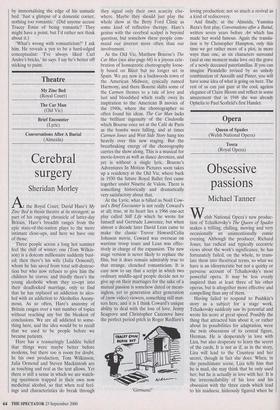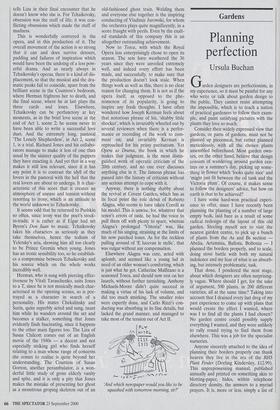Opera
Queen of Spades (Welsh National Opera) Tosca (Royal Opera)
Obsessive passions
Michael Tanner
Welsh National Opera's new produc- tion of Tchaikovsky's The Queen of Spades makes a trilling, chilling, moving and very occasionally an unintentionally comic evening. Although the producer, Richard Jones, has radical and typically eccentric views about the work's significance, he has fortunately failed, on the whole, to trans- late them into theatrical terms, so what we have is an idiosyncratic but not a quirky or perverse account of Tchaikovsky's most powerful opera. It may be less evenly inspired than at least three of his other operas, but is altogether more effective and compelling than any of them.
Having failed to respond to Pushkin's story as a subject for a stage work, Tchaikovsky suddenly saw its potential and wrote his score at great speed. Possibly the thing that attracted him about it, or rather about its possibilities for adaptation, were the twin obsessions of its central figure, Herman. He is desperately in love with Liza, but also desperate to learn the secret of the cards. It is not as if, as in the story, Liza will lead to the Countess and her secret, though in fact she does. When, in the penultimate scene, Liza tells him that he is mad, she may think that he only used her; but he is actually in love with her. It is the irreconcilability of his love and his obsession with the three cards which lead to his madness, hideously figured when he tells Liza in their final encounter that he doesn't know who she is. For Tchaikovsky, obsession was the stuff of life; it was con- flicting obsessions which made the stuff of madness.
This is wonderfully conveyed in the opera, and in this production of it. The overall movement of the action is so strong that it can and does survive detours, padding and failures of inspiration which would have been the undoing of a less pow- erful drama. And as nearly always in Tchaikovsky's operas, there is a kind of dis- placement, so that the musical and the dra- matic peaks fail to coincide, apart from the brilliant scene in the Countess's bedroom, where Herman frightens her to death, and the final scene, where he at last plays the three cards and loses. Elsewhere, Tchaikovsky can be perfunctory at key moments, as in the brief love scene at the end of Act 1, scene 2; he seems never to have been able to write a successful love duet. And the extremely long, pastoral `The Lonely Shepherdess', in Act 2, scene 1, is a trial. Richard Jones and his collabo- rators manage to make it less of one than usual by the sinister quality of the puppets they have enacting it. And yet that in a way makes it still less relevant, since if it has any point it is to contrast the idyll of the lovers in the pastoral with the hell that the real lovers are about to undergo. It is char- acteristic of this score that it creates an atmosphere of unease and tension without resorting to irony, which is an attitude to the world unknown to Tchaikovsky.
It seems odd that he returned to Pushkin so often, since irony was the poet's stock- in-trade; it is rather as if Elgar had set Byron's Don Juan to music. Tchaikovsky takes his characters as seriously as they take themselves, hence the tedium of Yeletsky's aria, showing him all too clearly to be Prince Gremin when young. Jones has an ironic sensibility too, so he establish- es a compromise between Tchaikovsky and his source which on the whole works incredibly well.
Herman, who is sung with piercing effec- tiveness by Vitali Taraschenko, suits Jones to a T, since he is not musically much char- acterised in the opening scenes, so is por- trayed as a character in search of a personality. His mates Chekalinsky and Surin, quite superbly acted and sung, taunt him while he wanders around the set and becomes a stalker, something that Jones evidently finds fascinating, since it happens to the other main figures too. The Liza of Susan Chilcott comes out of an English movie of the 1940s — a decent and not especially striking girl who finds herself relating to a man whose range of concerns she comes to realise is quite beyond her understanding. The Countess of Susan Gorton, another perambulator, is a won- derful little study of gross elderly vanity and spite, and it is only a pity that Jones makes the mistake of presenting her ghost as a monstrous groping skeleton out of an old-fashioned ghost train. Welding them and everyone else together is the inspiring conducting of Vladimir Jurowski, for whom the orchestra plays quite magnificently, in a score fraught with perils. Even by the exalt- ed standards of this company this is an altogether outstanding achievement.
Now to Tosca, with which the Royal Opera less enterprisingly chose to open its season. The sets have weathered the 36 years since they were unveiled extremely well, and indeed every effort has been made, and successfully, to make sure that the production doesn't look stale. When things work as well as this, there is no clear reason for changing them. It is not as if the opera itself, as opposed to the phe- nomenon of its popularity, is going to inspire any fresh thoughts. I have often wondered how Joseph Kerman feels about that notorious phrase of his, `shabby little shocker', which is invariably wheeled out by several reviewers when there is a perfor- mance or recording of the work to com- ment on; and invariably Kerman is reproached for his prissy puritanism. Yet Opera as Drama, the book in which he makes that judgment, is the most distin- guished work of operatic criticism of the 20th century, and no one ever discusses anything else in it. The famous phrase has passed into the history of criticism without any serious attempt to cope with it.
Anyway, there is nothing shabby about the revival at Covent Garden, which has as its focal point the role debut of Roberto Alagna, who seems to have taken Corelli as his model. This is unwise, for, whatever that tenor's errors of taste, he had the voice to pull them off with plenty to spare, whereas Alagna's prolonged 'Vittoria!' was, like much of his singing, straining at the limits of his now parched tones. As for the reckless pulling around of 'E lucevan le stelle', that was vulgar without any compensation.
Elsewhere Alagna was cute, acted with aplomb, and seemed like a young lad in need of an older woman's comforting, which is just what he got. Catherine Malfitano is a seasoned Tosca, and should now rest on her laurels, without further tarnishing. Anthony Michaels-Moore didn't quite succeed in making a virtue of his lack of volume, and did too much smirking. The smaller roles were expertly done, and Carlo Rizzi's con- ducting was absorbing in its fine details, but lacked the grand manner, and managed to take most of the tension out of Act II.
And which newspaper would you like to be squashed with tomorrow morning, sir?'























































































 Previous page
Previous page